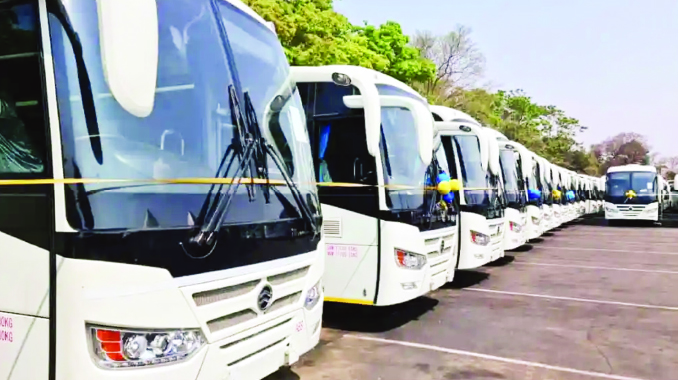EDITORIAL COMMENT: Zupco should move without prodding

AN efficient and affordable public transport system is required in urban Zimbabwe, with Harare, thanks to some appalling colonial town planning, in a particularly serious position.
This requires at present a serious degree of co-operation between Government, Zupco and private bus and kombi owners to ensure that there is a large enough fleet of buses on the road and that the services are viable and do what everyone wants.
It is clear that this co-operation has broken down recently, some of the breakdown, the fault of the general economic conditions and the black market in spares and the like, and some because managers are not staying on the ball and pushing very hard indeed to make them work.
So the fact that Cabinet received reports that Zupco was actively involved in putting everything back together is welcome, on the basis that few people lie to Cabinet or the officials who feed the information to Cabinet. But it is clear that something went very wrong and that it has taken time for remedial efforts to be put in place.
Some of those efforts, making far better use of the fleet of 340 new buses that the Government has already assigned to Zupco, should have been made some time ago and there appears to have been a lack of management innovation and a desire to run an over-simplistic operation.
So the political pressure, which includes some from the President himself at the weekend, was desirable. The Government has been buying buses for Zupco to use, and Zupco must use them fully even if each bus needs two crews to stay on the road enough hours each day, not to be kept in depots for specific services only.
Many urban commuters have not seen or ridden in the new Golden Dragon buses and they are never or rarely seen at terminuses loading. Why? Zupco might only have around 15 percent to 20 percent of the fleet it needs, but that fleet should be continuously at work.
Passengers pay taxes, so they have contributed to the Government purchases. They see the President in the media commissioning the batches, they just do not see the buses later with Zupco drivers.
Zupco inherited a good set of services and a functional fleet in the 1980s through the nationalisation of the two companies that were providing the services in urban Zimbabwe.
For a variety of reasons, including declining management standards and the difficulty of ensuring that capital and maintenance costs were included in viable fares and subsidies, this service collapsed.
During the slow collapse we saw pirate taxis, the infamous Peugeot 504s, gradually taking over, which generated further viability problems, and then the arrival of the second-hand minibuses in private hands basically taking over the service without much in the way of central management although Government departments did licence the kombis and routes and battled to ensure basic safety standards.
The Second Republic took a deep breath and decided to resuscitate Zupco. This could not be an instant process. In very round figures, Zupco would need a fleet of around 3 000 buses to restore what was there and add in the extra services needed for both the new suburbs and the growing population of older suburbs.
The general spreading of commerce and industry also meant a larger number of workers needed two trips in each direction. This put a premium on management innovation and far more than just dusting off the old files.
That fleet has to be built up over several years, both because of the need for the initial capital and then to ensure that the operation is financially viable, with regular deliveries of new buses, not a total replacement at one fell swoop every eight years. So one of the smartest pieces of innovative thinking was the franchise arrangement. This both made use of the fleet that was physically there, so not depriving owners of income, and allowed a decent transition to an all-Zupco fleet as older private buses came off the road to be replaced by new Zupco buses.
This was coupled with a ban on pirate taxis and private kombis, something that sort of worked during the lockdowns, but with intermittent enforcement since.
The arrest of five police officers this week taking bribes at one roadblock shows the extreme edge of the problem.
The private operators include bribes in their operating costs and it is not difficult to find police officers sitting in these vehicles as passengers, sometimes travelling for free.
It needed both an efficient franchise arrangement and efficient enforcement to ensure that the private buses and kombis did join Zupco or leave the road. Both were missing according to reports.
So some franchise owners have beached their buses and kombis, others have ripped off the Zupco branding and gone pirate, charging twice to three times the Zupco fares, sometimes even more at late evening peak demand.
Viability and affordable fares place a premium on management. Buses make money when carrying good loads, never sitting in depots. Yes, subsidies of some sort may be required although exceptional management can minimise these.
The old HUOC and ZOC that formed Zupco had access to a small levy paid by employers of workers from high density suburbs, but 90 percent of income was fares, calculated on a formula that assumed exceptional management standards.
There has been talk about recreating Zupco as a public-private partnership and bringing in the sort of high level expertise from outside to help Zupco upgrade its management and build the service an upper-middle income nation deserves and needs.
It should be possible to get some of the specific input from the top end of cities with decent services, preferably from a modern operation in a go-ahead developing country where so much is similar and accumulated experience of what does and does not work can be found and applied.
The Zupco fleet is growing thanks to Government intervention, but now a lot more needs to be formalised and the actual operations upgraded to match that Government commitment.
Prodding by the President and Cabinet is working, but to be blunt the people running the services should be ahead of their political bosses and taking the lead.









Comments